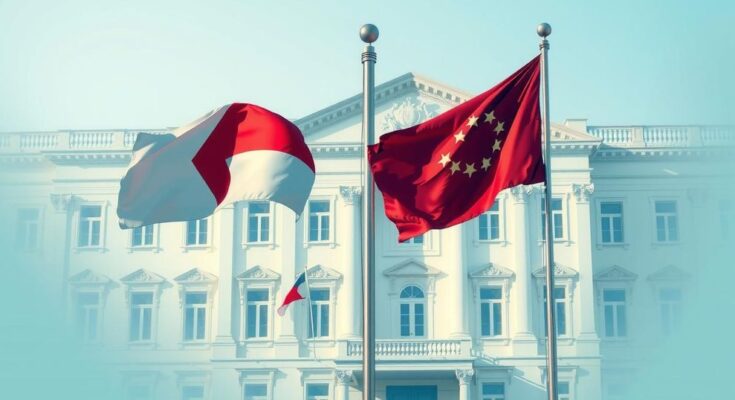Tensions escalate in South Africa following Ebrahim Rasool’s expulsion from the US, leading President Cyril Ramaphosa to reconsider ambassadorial appointments. With diplomatic relations under strain, Ramaphosa emphasizes the need for careful engagement, particularly amid proposals to rename streets that may provoke the US. The situation reflects both domestic political pressures and the importance of maintaining historical alliances as South Africa navigates its foreign policy.
Tensions are escalating as President Cyril Ramaphosa of South Africa deals with the fallout from the expulsion of Ebrahim Rasool, the former South African ambassador to the United States. Rasool was declared persona non grata due to his critical comments about President Donald Trump, which were deemed disrespectful by Washington. President Ramaphosa must now carefully contemplate who to appoint as a replacement ambassador, stressing the need for thoughtful deliberation in light of the strained relations.
The South African government, recognizing the significance of repairing the relationship with the Trump administration, views improved ties as a potential boon for trade opportunities. “Of course, the president is concerned about the current state of relations with the United States,” stated Vincent Magwenya, spokesperson for the presidency, highlighting Ramaphosa’s aim to enhance engagement with American officials.
In addition to Rasool’s expulsion, other sensitive issues, including South Africa’s Expropriation Act and legal proceedings regarding Israel, complicate the diplomatic landscape. However, Magwenya confirmed that the absence of an ambassador does not imply a cessation of diplomatic communication, with channels remaining open.
A proposal by the Johannesburg City Council to rename Sandton Drive after Palestinian activist Leila Khaled has raised alarms, as the US State Department cautioned that such an act could jeopardize the consulate’s operation. Magwenya commented on the renaming, affirming that it is part of South Africa’s efforts to rectify past injustices while also acknowledging the delicate nature of the situation. President Ramaphosa advised officials to manage this with care to prevent the crisis from escalating further.
The African National Congress (ANC) plans to hold a welcome rally for Rasool in Cape Town, although the presidency has expressed reservations about the event. Magwenya urged for restraint, citing the current tensions and the importance of avoiding provocative content during the rally.
Amid these tensions, the Democratic Alliance (DA) has called for the ANC to broaden consultations on foreign policy, prompting reflections on South Africa’s internal political dynamics that influence international relations. Ramaphosa’s administration regards the current diplomatic challenges as a “hiccup” and is adopting strategies to mend relations with the US.
Key actions have been outlined by Magwenya, including maintaining restraint on Rasool’s return, addressing the controversial street renaming, delaying UN delegations until trust is reestablished, and correcting misconceptions held by the US about South Africa. These strategies aim to alleviate diplomatic tensions and clarify South Africa’s stance on domestic policies, particularly regarding land reform.
As Ramaphosa seeks to mend relations with the US, he must balance domestic political demands with international relationships. South Africa values its historical alliances, including those with nations under US scrutiny. Magwenya emphasized that South Africa will not eliminate ties with countries perceived unfavorably by Washington, indicating that established relationships should withstand pressure.
In the coming weeks, President Ramaphosa is likely to devise a strategy that safeguards South Africa’s interests while adeptly managing its crucial diplomatic relationships, particularly with the United States. The situation requires careful navigation as the country endeavors towards a more constructive diplomatic future.
In summary, President Cyril Ramaphosa’s administration is grappling with the challenges posed by the expulsion of former ambassador Ebrahim Rasool, while also navigating internal political pressures and complex international relationships. The focus is on restoring cooperative ties with the United States while maintaining South Africa’s historical alliances. Ramaphosa’s intended diplomatic strategies aim to correct misunderstandings and bolster trade relations, highlighting the importance of careful diplomacy in addressing current tensions.
Original Source: evrimagaci.org




